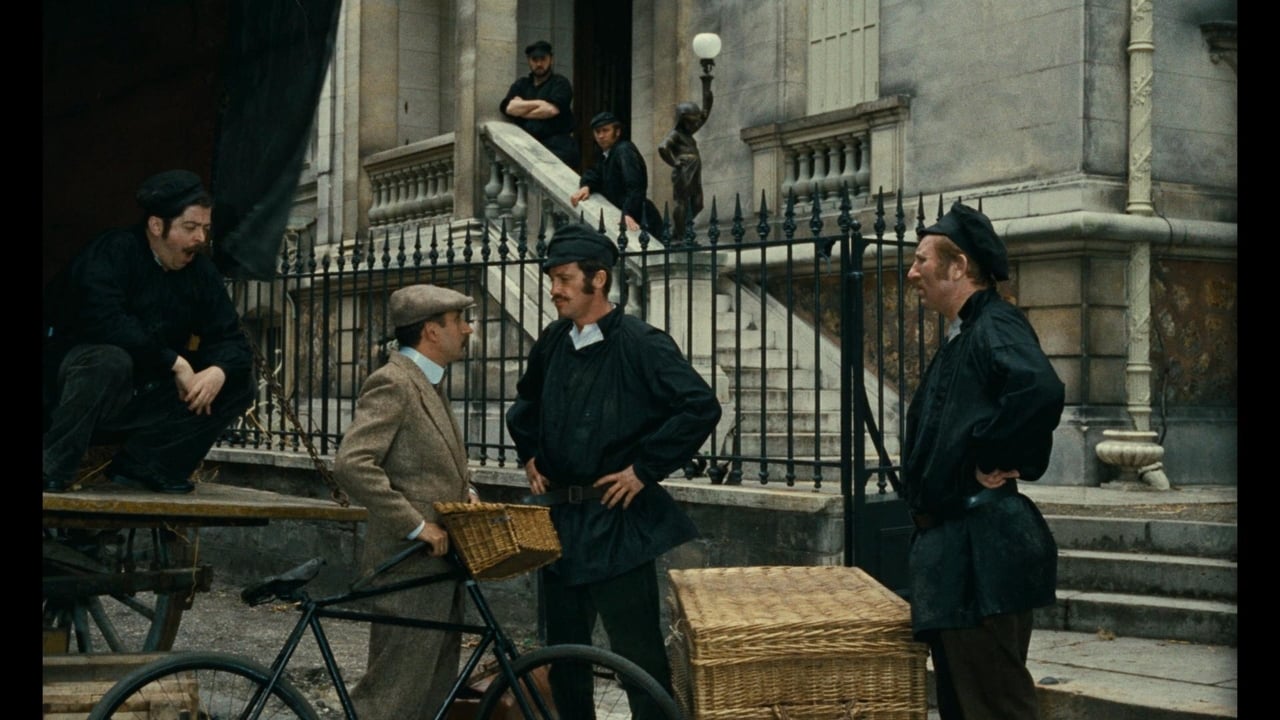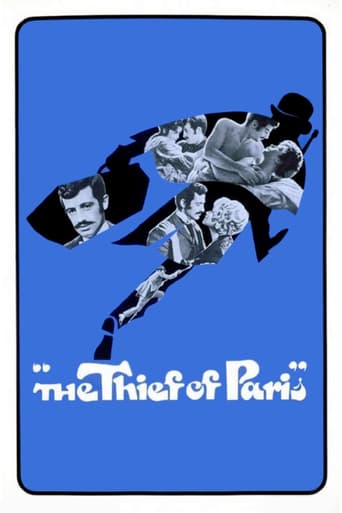Linbeymusol
Wonderful character development!
GamerTab
That was an excellent one.
Greenes
Please don't spend money on this.
CrawlerChunky
In truth, there is barely enough story here to make a film.
jotix100
Georges Randal, the rogue bandit that terrorized rich people in France, as well as in Belgium and England, was a man cheated from his own inheritance by an uncle that decided to concentrate in marrying Georges' own cousin, Charlotte, giving her a dowry that would guarantee her a good marriage. Georges began a spree of thefts that made him one of the most sought after bandits of the time. One thing that distinguished Randal was the ruthlessness in which he attacked the treasured objects of its owners. Georges loved Charlotte, but it their union was not going to happen because the uncle Urbain, saw to it Georges did not have a chance. Georges allied himself to a catholic priest who knew where to strike, passing himself for a saintly man of the cloth. They fooled everybody with their wit and resoluteness.Based on the novel by George Darien, Louis Malle and his collaborator Jean-Claude Carriere took the task to bring the novel to the screen, adapting it to fit the style for which the director was famous for. They opened the action, although the only fault is that it would have made a better picture if it would have been trimmed a bit because there are things that are repeated that should have been eliminated.In Jean-Paul Belmondo they found the ideal actor to carry the film. The actor, at the heart of his popularity, did what he could with his Randal, although there are times when he is bogged down by the screenplay. Genevieve Bujold, makes a ravishing creature to look, although she is only briefly at the beginning and at the end. Julien Giomar makes a valuable contribution as the Abbe La Margelle, the rogue priest behind some of the capers performed by Randal. Marie Dubois, Christian Lude, Francoise Fabian, the wonderful Marlene Jobert, add luster to the supporting cast. Bernadette Lafont, an excellent actress appears only briefly in the film.
Bob Taylor
... and those gorgeous eyes to look at. The film would be a lot better if it were 30 minutes shorter, and if Malle didn't lovingly photograph those rich interiors, that gorgeous furniture that Belmondo treats so brutally with his burglar tools. Jacques Saulnier did the production design, and this is a really handsome film to watch. It is a precursor to Stavisky..., the Resnais film that Belmondo starred in some years later, another Saulnier production. The solitary nature of the crimes Randal commits does not allow the idea of a confederation of criminals against the bourgeoisie to develop--this is one of the themes of the script that fails to work.The acting is always good. Guiomar as the crooked priest is always effective; you may remember him longer than you do Belmondo. Paul Le Person as a thief has some good scenes, as does Jacques Debary as the politician Randal robs while he's making a speech. The best scene for me was the Guiomar-Marie Dubois encounter, when she recounts a bogus story to the feigned surprise of the priest.Louis Malle was one of the greatest French directors, along with Resnais and Chabrol, yet he didn't always make the films that his talent should have let him do. Le Voleur is just too ripe, too pretty, too focused on surfaces to work for me.
max von meyerling
A pendant piece to VIVA MARIA. Louis Malle certainly, unlike some other fifties hipsters but also along with some other fifties hipsters, knew that something was happening in the sixties but didn't quite know what it was. It was, of course, sex, drugs and rock 'n roll - thousands of people in the street- the whole anti-establishment thing. Malle knew this and he didn't know this. He knew this instinctively but not specifically. In LE VOLEUR he presents a story of a young man, who, upon completing his education and military service, is cheated out of his inheritance and thwarted in love by the greed of the older generation disguising its self interest in pious social formalities. He almost accidentally discovers his talent for burglary and decides that it is his life's calling. This is a trope familiar to French existentialism especially in the films of Bresson and Melville. Belmondo, as the young man, Georges Randal, decides that he is going to attack the smug bourgeoisie one villa at a time. His sex life was what could be described as extremely contemporary. He lives on the boarders of respectable society. A life on the edge if you will. He shares his values with all sorts of nefarious characters in a sort of underground movement. While some have plans to turn the movement into something like a concrete political organization Belmondo prefers to keep it on a personal and individual level. The chief mover behind the politicizing of the movement is shot down after a political speech made by a reactionary politician. Even after achieving an enviable financial security Belmondo continues with his chosen profession, dedicated to the implication that it continues his never ending war against a hypocritical and selfish bourgeois society. A very sixties concept except that LE VOLEUR is a period picture, set in La Belle Epoch, the decades before the turn of the last century.VIVA MARIA is also a period picture but more overtly about revolution. Malle certainly had a feeling for the zeitgeist but was, as something of a bourgeois himself, distancing himself from identifying too fully with revolutionary politics as say someone like Regis Debray, a man of Malle's class who fought with Che Guevara in Bolivia. Certainly as all of the aspects of the cultural revolution of the late sixties came into sharper focus Malle, like the Belmondo character, avoided direct participation or indeed comment upon either the situation or any organized dissidence, preferring to make his statement by going within. His subsequent films included documentaries on India and fiction films dealing with incest in Vichy (LE Soufflé AU COEUR) and a collaborationist youth during the war (LACOMBE LUCIAN). He was to abandon France ten years after LE VOLEUR and made films in America before returning once again, ten years after, to France and a film about the ethics and morality of wartime collaboration (AU REVOIR LES ENFANTS) and, more pointedly, May '68 (MILOU EN MAI). But from VIVA MARIA and LE VOULEUR it was a long time in between laughs.LE VOLEUR is commendable, above all else, for it's single minded purpose, reflected in the dedication to his vocation by Belmondo. No crappy cinematic tricks. Guys who want to retire do so even after one last job, men who walk into the frame do not turn out to be undercover anythings, coincidences and ironies do not abound at the touch of a screenwriters whim or sloth. The sequence with Charles Denner, who is superb, is a highlight of the film. Geneviève Bujold has never looked more beautiful than in this film. If LE VOLEUR has one fault, it is that there are too many beautiful women in the film, a fault more revealing about the way times and standards have changed, than about Mr. Malle.LE VOLEUR, along with VIVA MARIA are perfect examples of what the Nouvelle Vague matured into, sort of its middle age, a strong combination of spirit, skill and generous budgets. A rare film to catch but entertaining, exciting, sexy, fun and intellectually stimulating. Highly recommended.
Spamlet
Just saw this forgotten gem by Louis Malle today on Starz. I absolutely loved it. I admit I have a huge bias towards movies about thieves: the artistry of their trade fascinates me (and explains why I can't get enough of playing "Thief" the computer game series).Nevertheless, this was an engrossing turn of the century period piece which is filled with brilliant, subtle characterizations of extremely interesting and complex characters. It's exciting without needing to be fast paced and it doesn't sacrifice depth of emotion (which is repressed but fully present under the surface as these characters must constantly re-evaluate their involvement in their chosen lifestyles).The film is beautifully structured so that by the end of it we, who have been voyeuristically caught up in the romance of suave criminals, must, like them, take stock of what has been lost.

